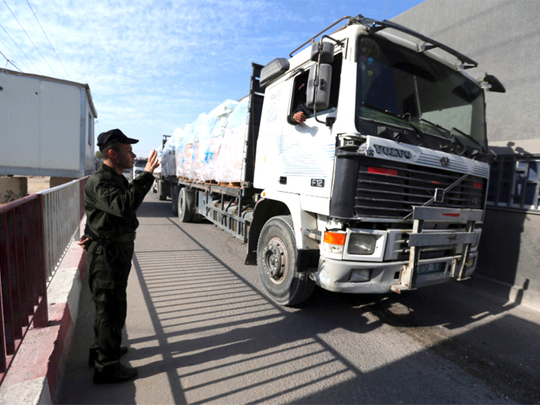
Gaza: Gaza’s merchants and consumers are reaping early rewards from reconciliation moves by the enclave’s dominant Hamas Islamists and the Western-backed Palestinian Authority (PA).
Israeli border restrictions, including a nearly blanket ban on exports from Gaza, and three wars since 2008 have imposed severe hardship in the territory.
Since Hamas ceded Gaza’s border crossings with Israel — the main gateway for commercial imports — to the Authority on Nov 1 under an Egypt-brokered unity deal, prices of many items in the territory have dropped.
The main reason for the decrease: the Authority has cancelled surcharges, sometimes as high as 25 per cent, that Hamas collected in cash from merchants in Gaza.
Businesses, in turn, have passed on some of those savings to customers: a 2017 Kia Picanto compact car, for example, now sells for $20,000 (Dh73,450) instead of $22,500, and a kilo of beef costs 40 shekels ($11), down from 50 ($15).
And this week, the PA, which takes its own tax in an arrangement agreed with Israel, allowed the import of cigarettes costing eight shekels a pack compared with the usual 21 shekels for other brands, through Israel’s Kerem Shalom commercial crossing for the first time.
Cigarettes used to come in only via smuggling tunnels under the Egyptian border but the PA is seeking an understanding with Hamas as well as Cairo to choke off that channel.
“(Hamas’s fees) led to a weakening of sales power because the people in Gaza live under bad economic conditions and because of the Israeli blockade and the loss of jobs,” said Tarek Al Saqqa, who owns an electrical goods company in Gaza, where unemployment tops 40 per cent.
Hamas, regarded by the West as a terrorist group, seized the enclave in fighting in 2007 against forces loyal to Palestinian President Mahmoud Abbas.
Mohammad Abu Jayyad, a Gaza economist and other local economic experts cautioned against any hopes of a rapid revival of Gaza’s economy unless Israel’s restrictions were fully removed.
“Israel said it would deal with the new administration in Gaza but in the way that would not allow Hamas and other factions to develop their military capabilities, which means it will continue to ban essential materials,” he said.
Responsibility for security in still an open issue in Gaza, where Hamas, which is still policing the territory, has what analysts say are at least 25,000 well-equipped fighters. Further unity talks are scheduled for Nov. 21 in Cairo.
Keeping pressure on Hamas, Abbas has yet to lift economic sanctions he imposed in Gaza in June that included a cut in salaries the Authority paid to 60,000 civil servants.
Abbas recently sent nearly 15,000 of them into early retirement.












